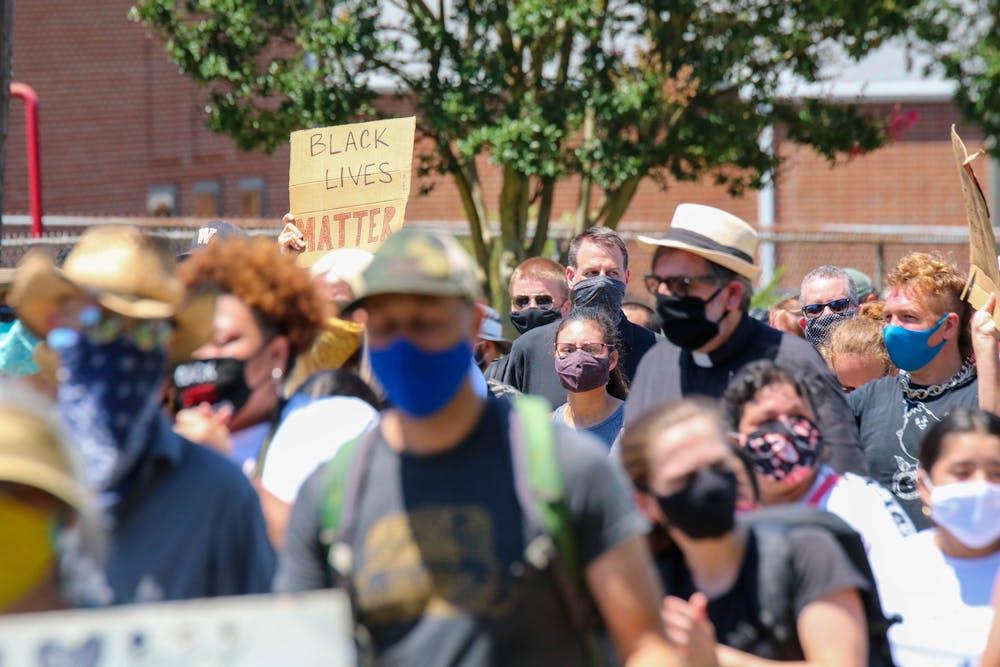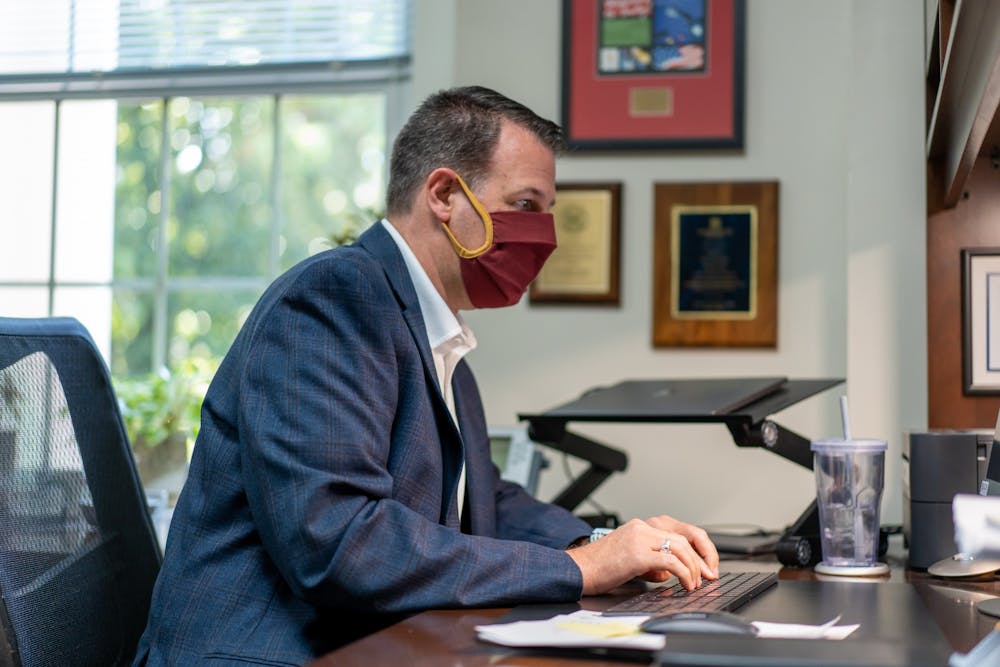Classes, events and student organizations are some of the things that will be different during the fall semester, but one thing will stay the same: emails from Jon Dooley.
Dooley is the vice president for student life and a man who wears many hats. In his role in student life, he serves as the chief student affairs officer and is a member of senior staff. On top of resuming campus update emails Wednesday mornings, Dooley is in charge of the office of student life. Under this office are 15 different departments that have to do with the student experience on campus, including student activities and health well-being, which, due to the coronavirus pandemic, is going to be different.
In planning for the fall semester, Dooley said it was important to consider how to resume the student experiences — in and out of the classroom — in a way that’s safe, but still holds a quality standard.
Classrooms have been modified for social distancing and reduced capacity. Tents have popped up across campus to hold classes and activities outdoors. Facilities for student activities have been modified, and student organizations are preparing adjustments to their activities through workshops. Dooley said students have to be mindful that things will not operate the way they normally do.
“I think it’s just important for students to be patient with themselves and with each other as they adjust to that new normal,” Dooley said.
On top of student affairs, Dooley also serves as a member of senior staff, which is composed of a group of university administrators who advise President Connie Book. Dooley’s role on senior staff is student-centered.
“The second [role] is to serve as a member of President Book’s, senior staff, and to help provide support and advice and guidance about the student experience on campus,” Dooley said.
This advice and guidance can be seen in the plans for the fall semester.
As fall semester begins, students are entering into a school year with tangential crises: a pandemic that has infected millions and killed thousands of Americans and a movement for social change as the country reckons with police brutality. Both crises have been felt in Elon and Alamance County, as case numbers continue to rise and students and faculty members — including Dooley — participate in local protests at the Confederate monument in Graham.

Vice President for Student Life Jon Dooley and Vice President for Strategic Initiative Jeff Stein marching at the Burlington-Alamance March for Justice and Community, on July 11 in Graham, North Carolina.
With these ongoing crises, students have looked to what university administration is doing in the face of a pandemic and racial injustice. Over the course of the summer, students have shared concerns with the university administration — including Dooley — about the fall semester.
Some students have questioned the safety in returning to campus this fall. Independently and through groups such as Boldy Elon Solidarity Collective — composed of students and organizations — students have called on Elon administration to be more transparent with decisions regarding the return to campus this fall. Students also hosted a “Die-In” protest on Aug. 13 on Young Commons to protest in-person classes.
In a town hall where Elon University and Alamance County community members expressed their concerns on reopening this fall, senior and Alamance County native Courtney Guthrie felt that student input wasn’t considered.
“It would be an understatement to say that other community members and I have been treated like an afterthought in the development of Elon University’s reopening plans for fall 2020,” Guthrie said. “This is not easy for anyone, but much less for the people who have no say in the decisions that will severely impact their personal, professional and academic lives.”
While planning for the fall semester and weighing the decision to hold in-person classes, several groups had input in making decisions, including the Board of Trustees, senior staff who met daily over the summer, representation from Student Government Association and, as well as faculty and staff representation.
The decision to hold in-person classes can be broken into several main considerations, according to Dooley. Two spheres of consideration were if academic experiences and the out-of-class experiences could still be done in a manner that maintains quality and safety.
In response to tuition not being reduced this academic year, some students have argued that they’re not getting an “Elon-quality” education. For students, worried about not getting the “Elon experience” this fall, Dooley said things will be different, but students have to work through it.
“I think we’re all frustrated as we think about our lives right now and part of that comes just from not being able to have full control over the virus and to recognize that the ways that we interact with each other and the ways our community comes together are just going to be different for the duration of this pandemic,” Dooley said. “And I hear that frustration. I recognize that things aren’t always as we want them to be or wish they could be, but part of our work is to figure out how we best move forward together.”
Other considerations were the budgetary impact of different scenarios this fall. Elon is projecting a 5% budget reduction over the next two academic years. Student enrollment and tuition are major sources of revenue for the university, and when Elon went remote this past spring, the university lost an estimated $13.5 million refunding room and board. The university has to account for loss of revenue and extra fees because of the pandemic.
Given that there’s a pandemic, health was also a major consideration. Testing capacity, including pre-semester tests and random testing — which is free for faculty, staff and students throughout the semester — was being examined for the fall.
Dooley said it was important for the university to communicate its plans for the fall semester and yield student questions and concerns, but noted that the university’s plans don’t always align with students.
“I think even over the course of the summer, as students have shared their questions and concerns, it’s helped us clarify information and make sure to get information out for folks,” Dooley said. “At the end of the day, sometimes, there will be situations where students will have one perspective and it may differ from the direction that the university decides to take. And we just have to recognize that sometimes we won’t always be in agreement on every course of action.”
While Dooley said he is responsive to student questions and concerns directed towards him, he believes there are other avenues like SGA to have concerns heard.
“I would say one of the most effective vehicles for influencing student change is through student government and through the elected student body leaders,” Dooley said.
SGA Executive President Robbie Miley was on the Task Force for Fall Semester 2020. Among the academic council and staff council, SGA was one of several groups to “lend their weight” in contribution to the “thinking and planning for the fall.” Miley was the only student on the task force.
While SGA has legislative power, it can also influence Elon culture and administration. Miley said students should use SGA representatives to funnel concerns to administration.
“[Student representatives] are pretty connected to a lot of the people on administration. I think one thing is that it’s really hard to see a lot of the things that happen behind the scenes,” Miley said. “So I think what students are doing and voicing their concerns, whether that’s on social media or directly to the administration, I think that’s really good, but I also there are times where there will be follow up and a little more information added to the situation [through SGA].”
As for his worries for the fall semester, Dooley said that the pandemic can be unpredictable.
“I think that we all have the same worries that, although we have plans and we have a vision for how we will handle this pandemic, it’s not always going to be predictable,” he said. “And so I think my concern is the concern that many share of how the virus will spread, what that will look like here on campus and in the community and I think each one of us shares some anxieties about what the next several months will look like.”


